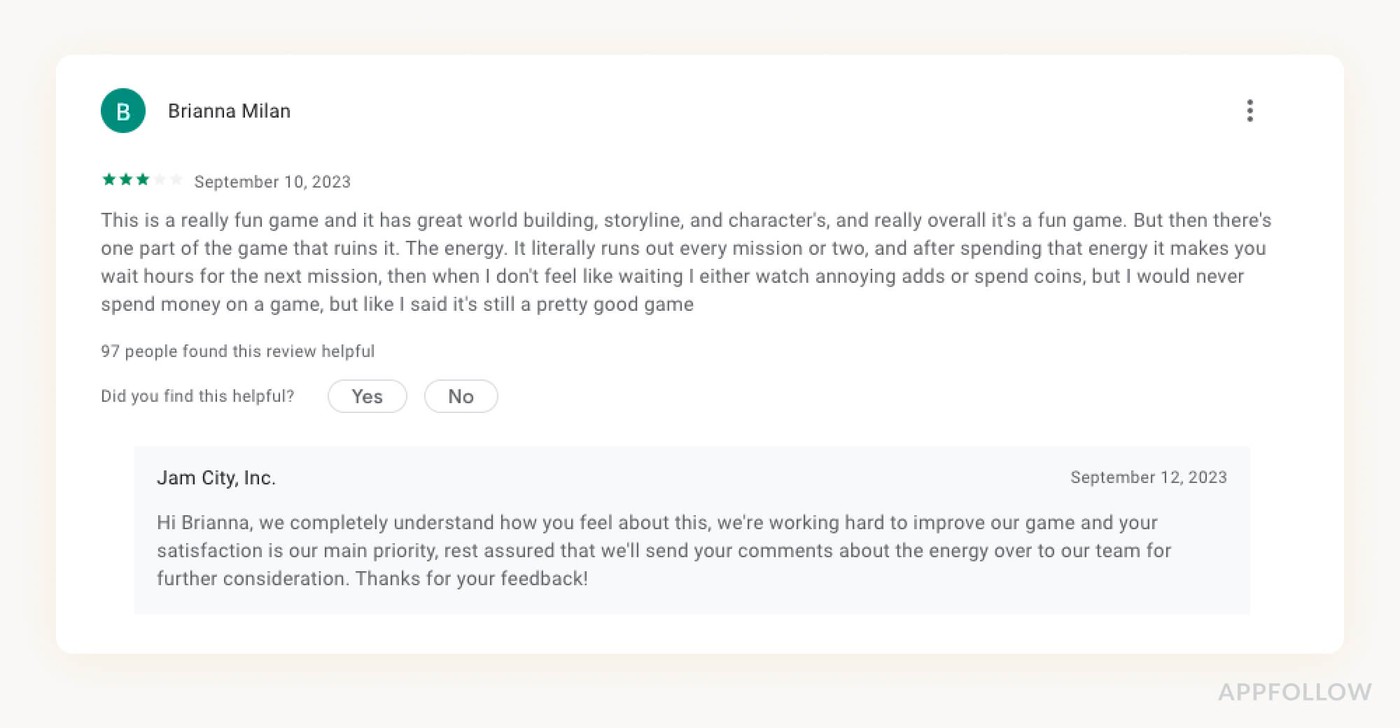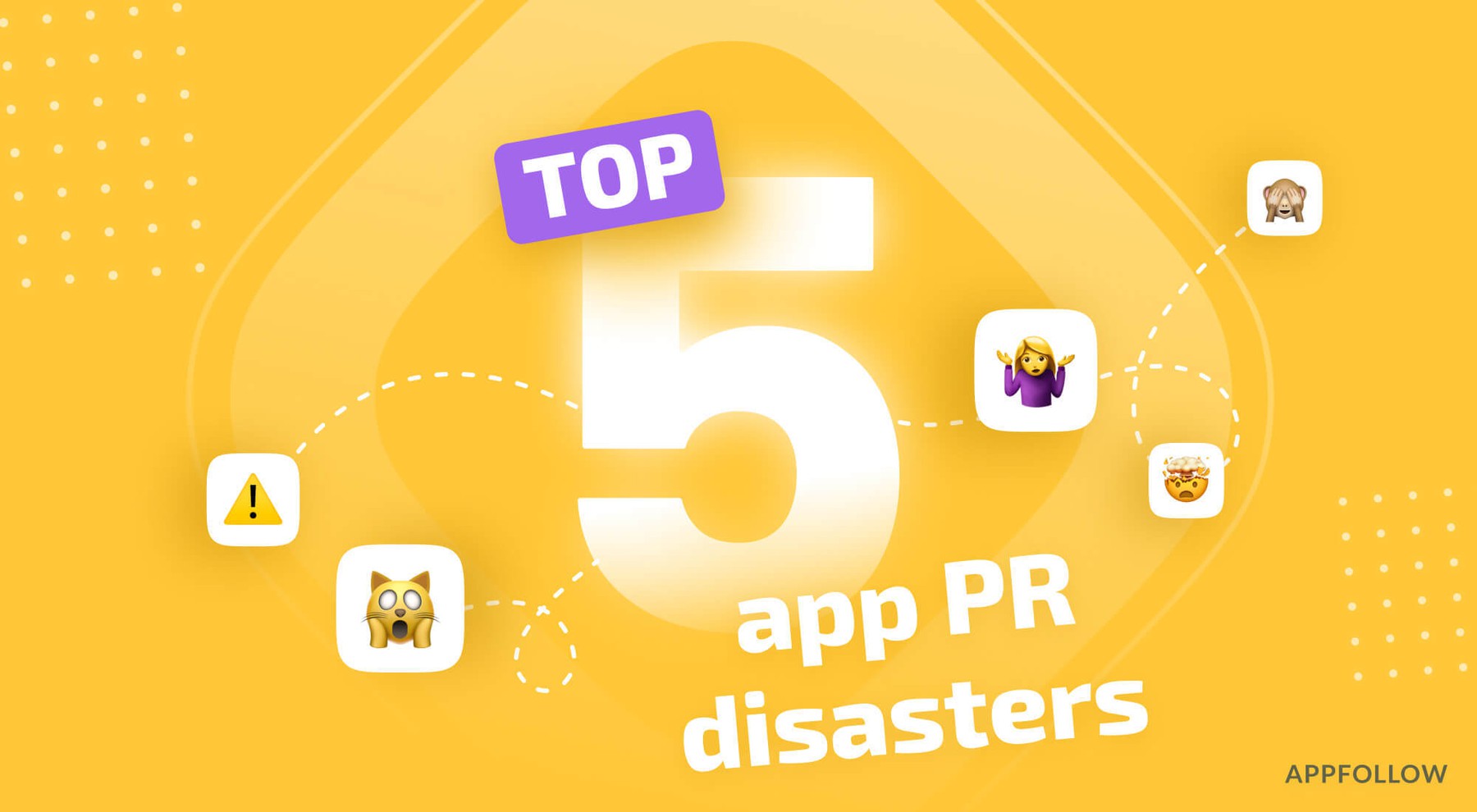A short guide to managing mobile game app reviews

Table of Content:
You've developed a mobile game, and it's out in the world. Now what? The feedback loop kicks in. App store ratings aren’t just about vanity metrics or bragging rights. Your app's star rating on platforms like Google Play and the App Store directly influences user trust, visibility, and downloads.
These ratings provide invaluable feedback for improvement. This article explores why ratings are the lifeblood of mobile game success and how to navigate this feedback terrain using AppFollow.
Why are app store ratings important?
App reviews directly impact your app's rating and user trust.
Your app's star rating matters. Users look at it to judge your app's quality. If they see a high rating, they're likely to download it. With a low rating, they'll probably pass. Especially if they're choosing between two similar apps. Your brand also suffers from bad reviews.
App stores, like Google Play and App Store, also care. An app with low ratings won't get promoted much. Why? They want to show users quality apps. A low rating tells them your app isn't meeting user needs. This means less visibility and a slim chance of being featured or ranking high in searches.
Google Play even lets users filter by apps rated 4.0 or 4.5 and up. Score below that, and you'll get overlooked more.
For app publishers, reviews are direct feedback. They tell you what needs fixing, what users want, and where you're messing up.
Case studies
There are plenty out there, with a few notable examples you’ll see below.
Harry Potter: Hogwarts Mystery
Harry Potter: Hogwarts Mystery didn’t get a nice start at all. A few years back, this particular title faced a lot of backlash and review bombing due to some bad choices.
The gameplay drains your character's 'energy' fast. You need energy for almost everything: talking, reading, seeing friends, even resting. Here’s a situation:
When you're out, wait four minutes for each energy point or pay real cash. It's irritating, especially when the game constantly nudges you to pay. In one early scene, your character gets trapped by the Devil's Snare. Regardless of your energy, it'll run out. You're then faced with a choice: pay up or watch your character get choked.
Given the game's target audience is kids, this was a really unfair tactic to use. That resulted in a very steep drop in the game’s ratings in both the App Store and Google Play.
To address these complaints, the developers made slight changes to the energy system and added more free energy opportunities and content. Still, many find the pressure to pay too much.

Jam City is trying to do something with its audience, at least. They’re doing much better now—a 3.8-star rating at 2.5 mln. downloads. As you can see, they do respond to user reviews on occasion, and they don’t take too long to do that. Given time and less revenue-oriented gameplay mechanics, perhaps they may reach a 4-4.5 star rating as well.
Genshin Impact
In September 2021, Genshin Impact got bombarded with negative reviews—and for a good reason.
The game has faced backlash for months due to disliked updates. The introduction of 5-star character Yoimiya was a mess—players thought her abilities were faulty, and her gameplay design was half-baked. The next 5-star character, Baal, faced the same issues.
An anniversary stream in August 2021 was a flop as well. Not only did the English version start over an hour late, but the rewards were also seen as petty. In gacha games, anniversaries usually mean big rewards, often premium currency that takes ages to earn normally.
The weak rewards, combined with the developer miHoYo's silence on issues, made players even angrier. Many went on to the game's mobile store pages to leave 1-star reviews. Google Play ratings have dropped below three stars.

However, just like the Harry Potter game, Genshin Impact has made an excellent recovery. They sure take their time with answers, but it’s better than nothing. The game is currently at a 4.2 rating with 4 mln.+ downloads.
Focusing on the impact of ratings & reviews
Get your app rated high on Google Play and Apple App Store. High ratings get more downloads and better store visibility. Want that high rating? Here's how:
- Answer reviews. Don't just nod and move on. Talk back. Especially to those pesky 1-3 star ratings. Got fewer resources? Prioritize those. If possible, tackle all ratings. Why? Users can change their reviews. A good response might flip a 1-star to a 5-star.
- Use AppFollow templates. Why waste time?
- Fix problems and tell users. Got a bug reported? Fix it, then tell the user. They might up their rating.
- Categorize and report feedback. Don't drown in reviews. Organize them. Know what your users want – feature requests, bugs, and UI issues. The review section? It's a gold mine. Dig in.
- Speak their language. And I'm not talking about tech-speak. If they talk in French, reply in French.
- Localization isn't just about metadata. It's about connecting. Reply in the local language. It makes a difference.
Responding to game reviews with AppFollow
You can tag any feedback your app gets. Use tags to sort feedback so you can report to your team without fuss. Here are some tag ideas:
- Feature requests
- Bugs
- UX issues
- Positive feedback
You decide on the tags based on what works for you. Say users want a new feature. Tag those reviews. When you release the feature, you can see all the requests in one spot and tell your users about the update fast.
Besides replying to reviews from Google Play and Apple App Store via AppFollow and getting alerts on new reviews, tags help you:
- Alert your team to problems
- Sort reviews by feedback type
- Quickly tell users about updates and fixes
- Get notified of new reviews & act faster
Respond to reviews straight from AppFollow. Tag them—this helps track common topics. Spot a big issue? Share it with your team through AppFollow. Want detailed reports on tagged reviews? Export them from AppFollow for your product team. Simple.
Conclusion
App store ratings aren't just numbers—they're reflections of user trust, feedback, and your brand's reputation. Ratings can make or break an app's success. With proactive management via AppFollow (or any other customer review software) and a genuine commitment to user feedback, even the toughest situations can become opportunities for growth.
Every review you respond to is a chance to improve, connect, and build lasting trust with your audience. Embrace the feedback, prioritize your responses, and keep your app in the right spot for 4-4.5+ star ratings.
Read also
Looking to protect your company's image? Learn what is brand reputation management today.






